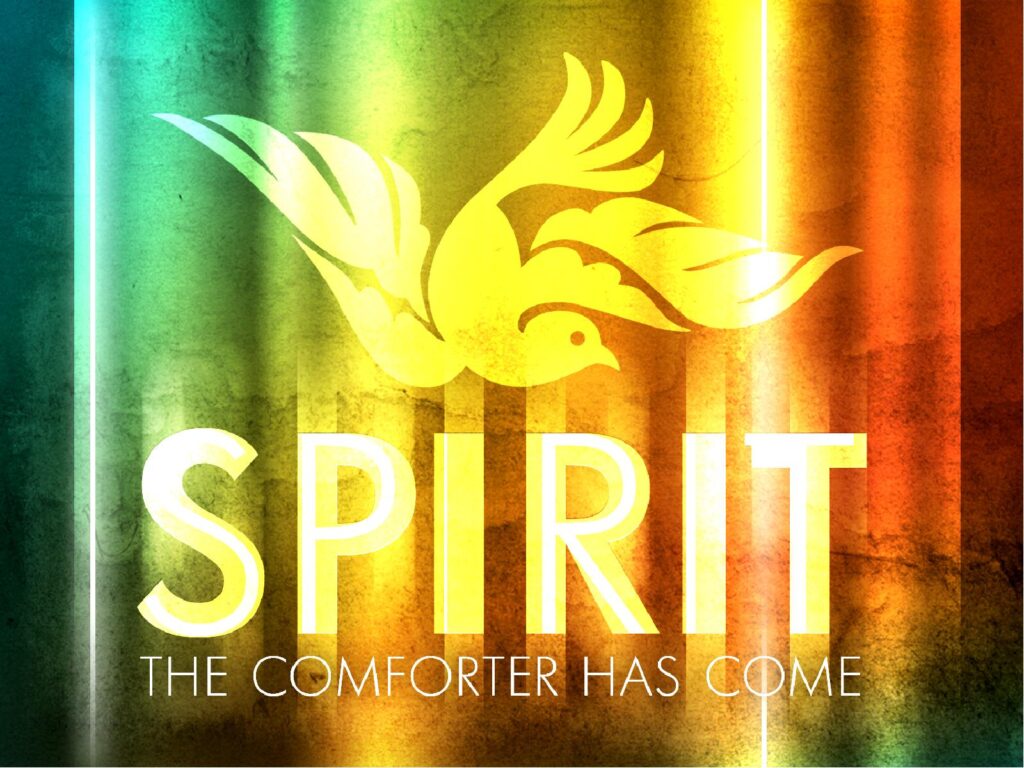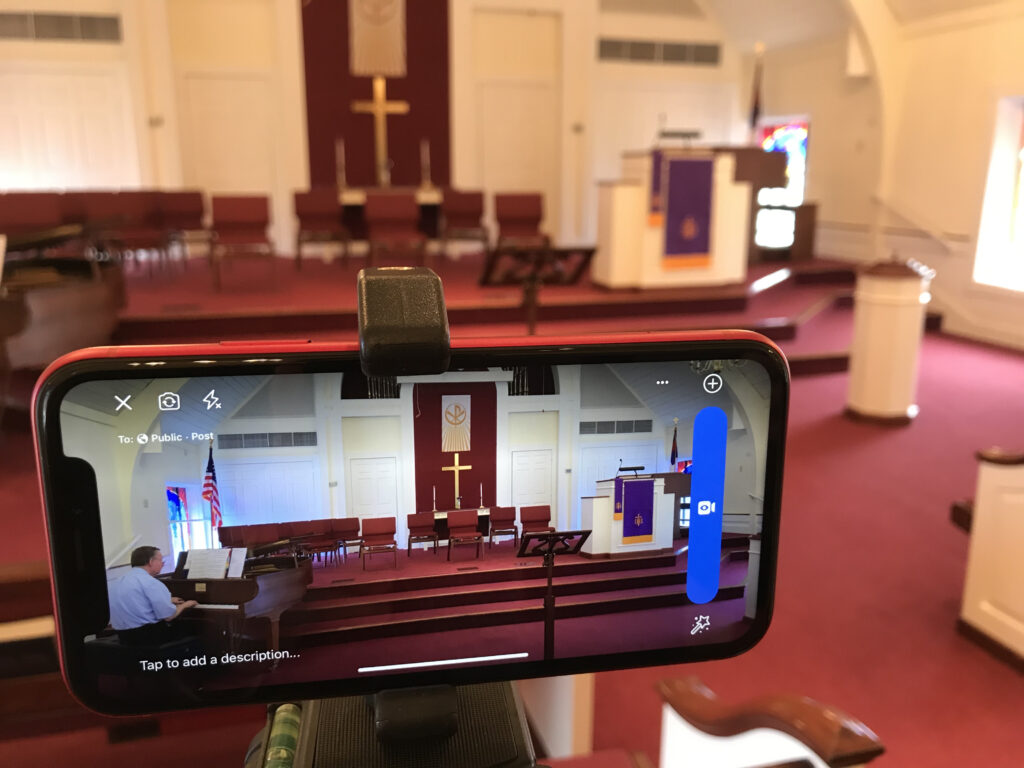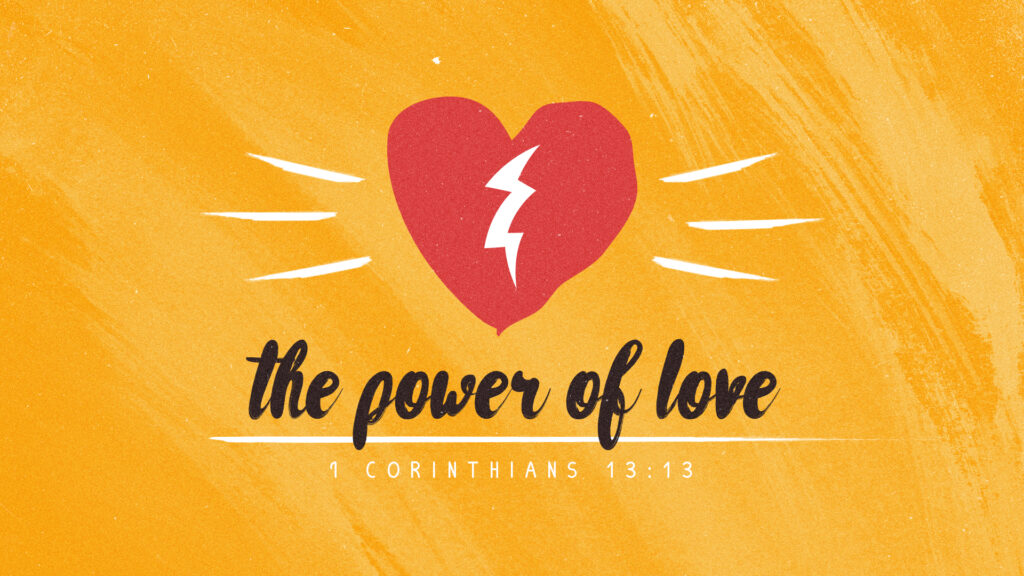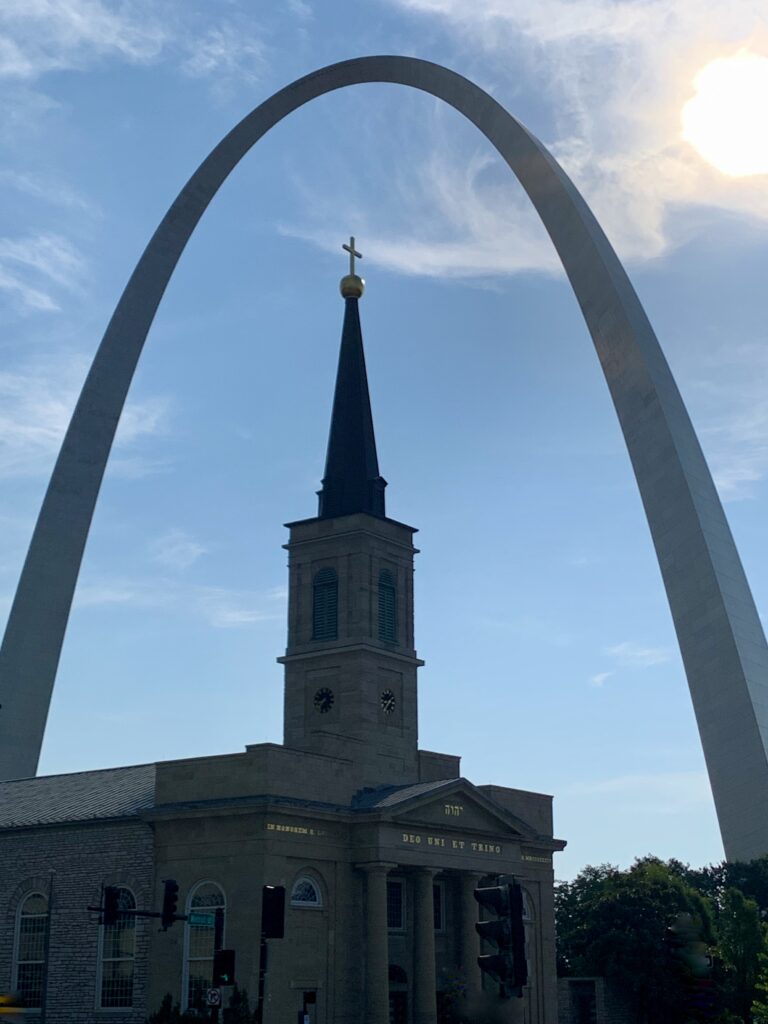
May 2021 Pastor’s Corner – Conviction

“I tell you the truth: it is to your advantage that I go away, for if I do not go away, the Helper will not come to you. But if I go, I will send him to you. And when he comes, he will convict the world concerning sin and righteousness and judgment: concerning sin, because they do not believe in me; concerning righteousness, because I go to the Father, and you will see me no longer; concerning judgment, because the ruler of this world is judged.” (John 16:7–11)
I received some news this afternoon that absolutely threw me for a loop. The news itself wasn’t particularly bad or good, and really wasn’t even directly for or about me. And yet, it absolutely threw me off balance and left me in a place of profound introspection and self-examination. For whatever reason, it “laid bare my soul” and I found myself questioning much of what I thought I knew, believed and took for granted even just a few hours ago. What was it that caused me to react in such a way?
Conviction. Specifically the conviction of the Holy Spirit.
One of the reasons Jesus sent us the Holy Spirit is to convict us of our sin. Not in a “you’re a horrible, miserable person and I want you to feel guilt and shame” way, but rather a “sin keeps you from the fulness of life I bought for you on the cross, so let’s get rid of as much of it as we can” kind of way. We have an amazing ability to get comfortable with our misaligned priorities and values. Those priorities and values are probably not necessarily bad in and of themselves, but if they are more important to us than God and His Kingdom, then they are sinful and not righteous — it’s a subtle form of idolatry. It’s not necessarily that we have to get rid of those values and priorities, just that we need to put God’s values and priorities first. In the Sermon the Mount, Jesus said, “But seek first the kingdom of God and his righteousness, and all these things will be added to you.” (Matt. 6:33) I need to put God’s kingdom first, and trust Him to provide the rest.
The Holy Spirit used the news I received to shine a light on a couple of areas in my life where the kingdom of David was more important than the Kingdom of God. I’ll be honest, it wasn’t fun, and I spent quite a while doing some phenomenal self-rationalization and self-justification with God. And, honestly, I’m still working through it. I don’t like being told I’m wrong or in error, and I’m sure you don’t either. But I also know that God is shining the light in these areas of my heart because He loves me and wants His best for me. The same is true for you.
One of the key aspects of growing in holiness and faithfulness is keeping a soft heart that is sensitive to when the Holy Spirit is at work in us, convicting us of the areas in our lives that aren’t aligned with God’s heart and vision. As we celebrate the coming of the Holy Spirit on Pentecost this month, I pray that each of us would have tender hearts, shaped and formed by the Spirit of God in the image of the Son of God.
“…he disciplines us for our good, that we may share his holiness. For the moment all discipline seems painful rather than pleasant, but later it yields the peaceful fruit of righteousness to those who have been trained by it.” (Heb. 12:10–11)
Blessings,
Rev. David Garrison
Read more...

April 2021 Pastor’s Corner – It’s Just Not The Same

“Let us not give up meeting together, as some are in the habit of doing, but let us encourage one another—and all the more as you see the Day approaching.” (Heb. 10:25)
One of the most incredible aspects of the past year is how businesses and people adapted to the realities of the pandemic and stay-at-home orders. Things we used to only be able to do by leaving the house transformed in a few short weeks into things you could do from the comfort of your couch. Need groceries? Place the order online and you can pick them up without ever leaving your car. Want to eat out? No problem, they’ll bring the food and leave it at your door. The latest blockbuster movie? Catch it on release day right there in your living room. A year ago only the largest and wealthiest churches were live-streaming, but now almost every church is doing so, including ours. These are amazing and wonderful advances and changes, for which there is much to be thankful.
But can we be honest for a moment? As great as all of that is, it’s just not the same. How many times have you purchased the wrong quantity of something because you couldn’t tell how big it was from the teeny picture on your phone? We’ve almost finished a 25lb bag of flour we accidentally bought last April. Being able to use Doordash and UberEats is great… but no matter how quick they are, nothing beats the ambiance of the restaurant and eating it fresh from the kitchen. And Greyhound and Soul were amazing movies… but something gets lost when you’re not seeing it on the big screen.
All of that is even more true when it comes to church and corporate worship. We’ve learned a lot over the past year about what it truly means to be the church, that in many ways we are able to do more “Kingdom work” outside these walls than within them. And we are so grateful to be able to provide the ability to worship together when we can’t physically be present at the church. But, again, can we be honest? It really isn’t the same. And it shouldn’t be the same.
Much moreso than eating out, going to the movies or shopping for groceries, worshipping our Lord and Savior is meant to be done by being physically present with other believers. Yes, the Holy Spirit is still present with us and unites us together even when we’re apart, but there is something crucial and important that happens when we gather together for Sunday worship. Whether it’s singing our praises to the Lord, praying for one another, celebrating the Sacraments, or hearing the Word of God proclaimed, it’s meant to be experienced in-person, not over a screen.
You’ll see throughout this newsletter how we are moving back to in-person worship, ministry and mission. We’ll be talking about it more as the weather warms up as well. Right now, we’re looking at Pentecost Sunday as our “target date” for coming together as the Body of Christ. You are welcomed and encouraged to join us for in-person worship before that date or on it. Please know we’re not choosing to ignore the realities of the pandemic or letting our guard down. We are recognizing that great strides have been taken over the past few months and that we are now at a place where we can, with confidence, say, it’s time to gather back as the Body of Christ and get to work on the mission Christ has given to us in Madison Heights, Amherst County, and around the world. As our website says,
We are a biblically-based Presbyterian church seeking to experience and share God’s love to transform our homes, community and the world. We hope you will join us.
See you soon!
Read more...

March 2021 Pastor’s Corner – Casting Your Cares

Cast your cares on the LORD and He will sustain you;
He will never let the righteous be shaken. — Psalm 55:22Cast all your anxiety on him because he cares for you. — 1 Peter 5:7
How are you doing, really? By the time this month ends, we’ll have lived in this pandemic with the ensuing quarantine and social distancing for an entire year. While some are anticipating that we’ll reach “herd immunity” by April, President Biden is suggesting that we shouldn’t expect a return to “normal” until Christmas. I think we’re all feeling the weight and strain in a heavier, more difficult way right now. It’s the weariness of being under stress and anxiety for a far longer period of time than our minds, our bodies and our emotions were meant to endure. And, of course, on top of the pandemic sits all of the pain and hurts that simply come with being human and being alive — pains and hurts that can be difficult enough to bear when we aren’t in a pandemic, but become nearly impossible to bear due to the pandemic. What are you doing with your hurts and pains (emotional and physical), the anxieties and fears, the weights and burdens of living in these hard times?
As the verses above remind and encourage us, God wants us to bring all of our cares and anxieties to him. But just what does that look like? I’m sure most of us have, at some point in time, cried out to the Lord and verbally thrown everything at him at once. That can be therapeutic — much like the whistle of a teapot lets off the pressure of the boiling water — and if you haven’t unburdened your soul that way in a long time, I absolutely encourage you to do so. But, if you have done that, you’ve probably found the same thing I have: while the immediate pressure release is helpful, the burdens and weights are still there. I’d like to invite you to try an ancient spiritual practice that helps us to hand our cares to the Lord in a more intentional way, a way that invites the Holy Spirit to sustain us more deeply.
The Daily Replay
The process is called The Daily Examen and was developed by St. Ignatius centuries ago. It is a 5-step process of prayerfully reviewing your day and anticipating the day to come. While meant to be practiced each day, it can be prayed at any point during the day. How long you take to work through the prayer is up to you — it could be as short as 5 minutes or as long as you need. Here’s an overview of what the process looks like:
1. Become aware of God’s presence.
Take several moments to breathe, relax, and invite God to be present with you.
Sometimes settling our body and mind is really difficult, especially when we have a lot going on.
One trick is to focus on our breathing. When we breathe slow and deep, we let our body and souls know that it is okay to relax and rest in God’s presence. Slowly take three seconds to breathe in through your nose, making sure to fill your belly with air . . . and then take three seconds to breathe out slowly through your mouth. Pause, then breathe in again. Repeat that a few times.
As you continue to breathe deeply and slowly, acknowledge God’s presence with each breath.
(Pause for a few moments)
2. Review the day with gratitude.
Look back through your day as if you were watching scenes from a movie. What happened? What were you like? What were others doing around you?
What are the good things that have happened today? What can you give thanks for?
(Pause for a few moments)
3. Pay attention to your emotions.
Ask yourself about how you felt at different points during the day.
What moments throughout your day have been difficult or tense?
When did you feel happy, excited, or at peace?
(Pause for a few moments)
4. Forgive, and ask for forgiveness.
Who are you angry or frustrated at?
Are there things you can forgive and let go in order to have peace?
What would you like to be forgiven for?
(Pause for a few moments)
5. Look toward tomorrow.
How might tomorrow be different?
What would you like to ask God to help with?
(Pause for a few moments)
Take some time to wrap up your conversation with God silently.
This kind of contemplative prayer can seem strange at first, but once we settle into the rhythm of it, I think you’ll find your awareness of the presence of God is growing stronger. Instead of just throwing our cares at God, through this process we more intentionally place them in God’s hands. Here are a few online resources to help you with The Daily Examen:
- A video walk-through of the prayer: https://fullerstudio.fuller.edu/prayer-of-examen/
- Using The Examen with teens and children (the above walkthrough is from this site): https://fulleryouthinstitute.org/blog/teaching-young-people-a-daily-way-to-pray
- A deeper look at The Examen: https://www.ignatianspirituality.com/ignatian-prayer/the-examen/
Blessings,
Rev. David Garrison
Read more...

February 2021 Pastor’s Corner – The Power of Love

If I speak in the tongues of men and of angels, but have not love, I am only a resounding gong or a clanging cymbal. If I have the gift of prophecy and can fathom all mysteries and all knowledge, and if I have a faith that can move mountains, but have not love, I am nothing. If I give all I possess to the poor and surrender my body to the flames, but have not love, I gain nothing. (1 Cor. 13:1–3)
The Longest Shortest Month of the Year
It All Boils Down To…
“Full Of Sound and Fury, Signifying Nothing” — Macbeth
We love because he first loved us. If anyone says, “I love God,” yet hates his brother, he is a liar. For anyone who does not love his brother, whom he has seen, cannot love God, whom he has not seen. And he has given us this command: Whoever loves God must also love his brother. (1 John 4:19–21)
Rev. David Garrison
Read more...

January 2021 Pastor’s Corner – Reset

We are a biblically-based Presbyterian church seeking to experience and share God’s love to transform our homes, community and the world.
Last year was something special, wasn’t it? The trouble we knew was brewing when the year began pales in comparison to how 2020 actually unfolded. We faced challenges and difficulties that we never could have dreamed or imagined. We found our lives disrupted in unprecedented ways. And what we thought was going to be a problem and challenge for a few months has persisted into this new year as well. Out of necessity and concern for our own well-being, and that of others, we have found ourselves retreating from much of the normal rhythms and patterns of our lives. Some of us haven’t left the house, other than for work or groceries, since April. In times of trial and struggle, it is a natural, human reaction to withdraw and become insular, to focus on yourself and your family. Sometimes, doing so is a necessity in order just to survive.
What is true for us as individuals has also been true for us as a church. We have had to adapt to an entirely different way of being and doing the work of the church, and that adjustment is still ongoing. The changes and shifts in our culture over the past decade or so kicked into overdrive because of this pandemic, and to be honest, we were kind of caught off guard. While some adjustments happened quickly and relatively smoothly (such as shifting to online worship), many of the changes and shifts we need to make are still ongoing. As we’ve wrestled and struggled this year, as a church we have focused more on ourselves than on our community and our mission. Not entirely, but significantly.
Time for a Reset
When your computer or phone starts acting weird, one of the first things to try is to reset your device. Often, this is as simple as doing a restart — just shut it off and then turn it on again. Sometimes, you might need to reset the device — erase everything and restore it from a backup. A reset is more time consuming, but is also more effective at cleaning out the bugs and the junk that build up over time. I wonder if we, as individuals but perhaps more as a church, aren’t in need of a “reset” as well?
The quote at the top of this article is the first sentence on our church website. It is Northminster’s purpose statement, a sentence that explains in a succinct manner why we exist as a community of faith. While the world and culture around us has changed, our mission and purpose have not. While we are all struggling to address and adapt to our pandemic-ravaged world, the Gospel has not changed. How we present the Gospel might change, how we go about Gospel work might change, but the Gospel itself is timeless and unchanging. “…to all who received him, to those who believed in his name, he gave the right to become children of God— children born not of natural descent, nor of human decision or a husband’s will, but born of God.” (John 1:12–13)
Perhaps we need a reset — as Christians and as a community of Christians. Reset our faith and our mission by doing a “factory reset” on our spiritual lives. Get back to the simple basics of the Gospel and the Kingdom of God. Let’s start this year off by asking if we are truly experiencing and being transformed by God’s love in our lives and in our homes, and if not, why not? Let’s resolve to get rid of anything in our lives that is keeping us from knowing that love which surpasses all understanding (Eph. 3:12) so that we might love the Lord our God with all of our heart, soul, mind and strength (Mark 12:28-34). Then, let us come together as a community of faith ready to take the Gospel of our Savior Jesus Christ to those who don’t yet know the hope, life and love that can only be found through Him.
The challenges of 2020 haven’t stopped with the flipping of the calendar, but the Gospel has never been hindered by worldly circumstances. In fact, the Gospel has often thrived in circumstances much more challenging than what we’ve faced this past year. I believe the best is yet to come for Northminster and that God is going to do some amazing and special things through this congregation in the months and years to come. Let’s commit together to resetting our faith and lives so we can embrace the mission He is inviting us to join Him in doing.
“Therefore, if anyone is in Christ, he is a new creation; the old has gone, the new has come! All this is from God, who reconciled us to himself through Christ and gave us the ministry of reconciliation: that God was reconciling the world to himself in Christ, not counting men’s sins against them. And he has committed to us the message of reconciliation.” (2 Cor. 5:17–19)
Blessings,
Rev. David Garrison
Read more...

December 2020 Pastor’s Corner – The Importance of Advent

“The special note of Advent is its primary focus on the second coming of Christ, who will arrive in glory on the last day to consummate the kingdom of God — its orientation toward the promised future. Advent…differs from the other seasons in that it looks beyond history altogether and awaits Jesus Christ’s coming again “in glory to judge the living and the dead.” — Fleming Rutledge, Advent: The Once and Future Coming of Jesus Christ
This past Sunday, November 29, was the First Sunday in Advent. It marks the beginning of the Christian year. For most of us, Advent is the season preparing us for Christmas, as if it were simply the pre-Christmas season… after all, it does end on Christmas Eve. But Advent isn’t pointing to Christmas at all, it points far past Christmas. As the quote from Fleming Rutledge above states, Advent points not to Christ’s first coming, but to his Second. While we tend to treat Advent as a “countdown to Christmas,” it’s actually far deeper and meaningful.
It seems that, each year, we are in a bigger and bigger rush to get to Christmas. Stores have been pushing the “unofficial” beginning of the Christmas season earlier and earlier, and this year has pushed it even further — I saw Christmas decorations in stores this year weeks before Halloween! It is a strange and confusing thing to see Halloween and Christmas decorations side-by-side. Jack Skellington would be furious! But I also get it — 2020 has been an amazingly difficult year (although not even close to the worst year ever. That honor goes to 536 AD. No, seriously. Look it up). After months and months of the pandemic and social distancing, a terribly contentious presidential election cycle, murder hornets, and record-breaking natural disasters, we’re all pretty desperate for a little light and a dash of Christmas cheer. While I’m personally a staunch “no Christmas music until after Thanksgiving” Scrooge, I won’t judge anyone who has already put up a Christmas tree, some decorations, or gone all-in on Christmas music.
But don’t rush past Advent in order to get to Christmas. While Advent has a particular emphasis on the Second Coming of Christ, it does so with its feet firmly grounded in the present reality. As Fleming Rutledge explains, “Advent contains within itself the crucial balance of the now and the not-yet that our faith requires. [T]his book will explore this theme in relation to the yearly frenzy of “holiday” time in which the commercial Christmas music insists that “it’s the most wonderful time of the year” and Starbucks invites everyone to “feel the merry.” The disappointment, brokenness, suffering, and pain that characterize life in this present world is held in dynamic tension with the promise of future glory that is yet to come. In that Advent tension, the church lives its life…The Advent season encourages us to resist denial and face our situation as it really is” (Advent pp. 7-8). The hope of Christ’s Second Coming, even the joy of celebrating his First coming at Christmas, is all the more bright and joyous because of the dark, brokenness of this present world, not in spite of it.
Advent is not for the faint of heart. But there is a gift waiting for you, if you are willing to slow down and find it. They say it’s always darkest just before the dawn…is it not the darkness of the night that causes us to appreciate the light all the more? Allow yourself to be present in the hardness and pain of 2020 and in Advent’s much-needed reminder that, one day, Jesus Christ will come back and make everything sad untrue and make everything broken whole. In doing so, we find that Christmas takes a place in our life and our hearts far more true than decorations, songs and presents.
“The light shines in the darkness, but the darkness has not understood it.” (John 1:5)
Blessings,
Rev. David Garrison
Read more...

November 2020 Pastor’s Corner – Being, Having, Giving Thanks

And whatever you do, in word or deed, do everything in the name of the Lord Jesus, giving thanks to God the Father through Him. — Colossians 3:17
Being Thankful
Whenever I have opportunity to talk with the Presbytery leadership about Northminster, I am always quick to talk about how loving and supportive you are of my family and me. Over the past month, we have been overwhelmed with the cards and gifts you have sent for Pastor Appreciation Month. What I appreciate even more is that you share your appreciation throughout the entire year. I am so grateful and thankful to have the opportunity to serve alongside you in service to our Lord and Savior. It is easy to “be thankful” when one gets to serve a congregation as wonderful as you are.
Having Thankfulness
This has been a very challenging year, to say it lightly. We have all faced difficulties we never would have expected or anticipated, both individually and as a society. But even in the midst of the hardship, God is still good and His blessings abound. Each day, the sun continues to shine, our lungs fill with air, we have clothes on our backs, food on our tables, and a roof over our heads. While we all wish and yearn for this pandemic to come to an end, there are countless blessings for which we can have thankfulness in our hearts to God. If “being thankful” is something we do in a moment, “having thankfulness” is more of a continuous state of being. I invite you to think about ways you can cultivate an “attitude of gratitude,” even in these difficult times.
Giving Thanks
An important part of that “attitude of gratitude” is to express it by giving thanks. On behalf of the Session, I’d like to give thanks to God the Father for each of you. Throughout the difficulties and challenges of this year, you have faithfully continued to support the work and ministry of this church. Your monthly giving has exceeded last year’s every month except for two, and our income has exceeded our expenses each month except for two. Where last year at this time we were facing an uncertain financial situation, because of your generosity we are much more stable this year. We do not know what the future holds, but we know the One who holds the future. We are excited, even in the midst of the uncertainty, about what God has done, is doing and even more for what God has yet to do through you and this church in the months and years to come.
Blessings,
Rev. David Garrison
Read more...

October 2020 Pastor’s Corner – Pulling Together — For The Kingdom

He handed out gifts of apostle, prophet, evangelist, and pastor-teacher to train Christians in skilled servant work, working within Christ’s body, the church, until we’re all moving rhythmically and easily with each other, efficient and graceful in response to God’s Son, fully mature adults, fully developed within and without, fully alive like Christ.— Eph. 4:11–13 THE MESSAGE)
For this reason I remind you to fan into flame the gift of God, which is in you through the laying on of my hands, for God gave us a spirit not of fear but of power and love and self-control. — 2 Tim. 1:6–7The saying is trustworthy: If anyone aspires to the office of overseer, he desires a noble task. — 1 Tim. 3:1
Rev. David Garrison
Read more...

September 2020 Pastor’s Corner – How to Vote in November

“But seek first the kingdom of God and his righteousness, and all these things will be added to you.” (Matt. 6:33)
There’s More Than Just the Presidency
Vote for the Kingdom of God
Vote Your Conscience
Disagree with Grace
Accept the Results with Humility and Submission
Read more...

August 2020 Pastor’s Corner – Essential?

“What good is it, my brothers, if someone says he has faith but does not have works? Can that faith save him? If a brother or sister is poorly clothed and lacking in daily food, and one of you says to them, “Go in peace, be warmed and filled,” without giving them the things needed for the body, what good is that? So also faith by itself, if it does not have works, is dead.” (James 2:14–17)
Essential?
The Essential Church?
Rev. David Garrison
Read more...
